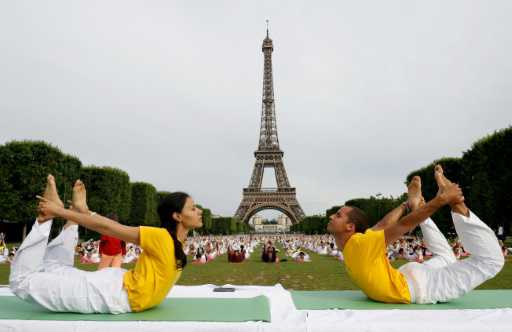Fans of yoga therapy have yet to win over doctors
28 June, 2018

Yoga practitioners often tout the unique health benefits of the ancient discipline -- from relieving stress and pain to improving vascular health -- but most doctors remain sceptical in the absence of hard proof.
The International Journal of Yoga Therapy (IJYT) published last year highlighted dozens of studies purporting to show that the practice can help people with eating disorders, soon-to-be moms and women with cancer-related symptoms.
Lionel Coudron, a 60-year-old French doctor, claims he is pain-free thanks to three hours of yoga per week.
"A few years ago, people thought yoga was (essentially) good at combatting stress", said the doctor, who set up a yoga therapy institute in Paris in 1993.
But the benefits of yoga -- including meditation, breathing exercises and posture -- go much deeper, Coudron said.
Jocelyne Borel-Kuhner, former head of an emergency ward in a Paris hospital, agrees. She set up the very first yoga therapy practice in 2012 with the specific aim of relieving pain for patients, particularly those with handicaps or arthritis.
Yoga therapy "isn't just a course of yoga adapted for people who are ill," but is individual consultation with a clinical examination followed by a care plan using yoga techniques.
The aim is to limit the therapy to between three and five consultations per patient, followed by exercises to be continued at home afterwards.
Six years and more than 2,000 consultations later, more than 800 patients have passed through Borel-Kuhner's practice, with some deciding to cease traditional treatment altogether because the yoga therapy is so successful.
Nevertheless, even proponents acknowledge there is little consensus on what might constitute specifically therapeutic stretches and poses.
"The lack of standardisation of yoga practices, and the fact that many yoga tools have filtered out into the broader world, begs the important question of what constitutes yoga therapy," two practitioners, Matthew Taylor and Timothy McCall, wrote in their lead essay for the IJYT.
A study released in January, for example, found no distinct health benefits between traditional yoga and Bikram, carried out in hot and humid rooms.
However, Taylor told AFP that hasn't dampened his enthusiasm.
"The scepticism is vanishing quite quickly and enthusiasm is now more the response, especially in light of the worldwide epidemic of chronic pain," he said.
Most studies which have been carried out, however, including peer-reviewed findings in journals like The Lancet or JAMA, have failed to pass muster with doctors and scientists.
While they point to research showing that yoga can indeed improve health, nothing appears to suggest such benefits could not be had through walking, swimming or other exercises and sports.
"There is evidence that doing yoga has specific health benefits. However, those benefits are likely not specific to yoga and are universal to exercise," the American doctor Steven Novella wrote last October on the website Science-based Medicine.
And Novella added that "all of the mystical and pseudo-scientific (trappings) that often accompanies yoga is counterproductive".
